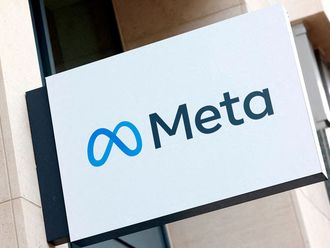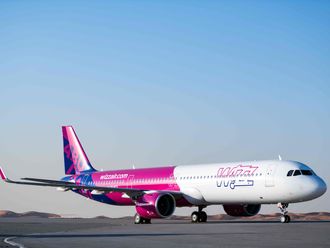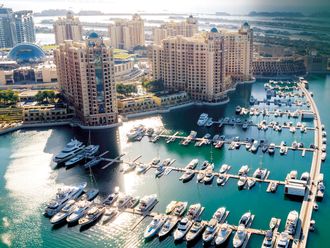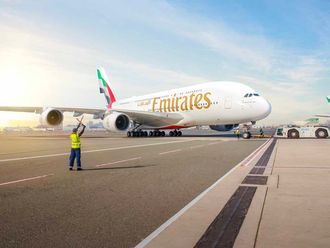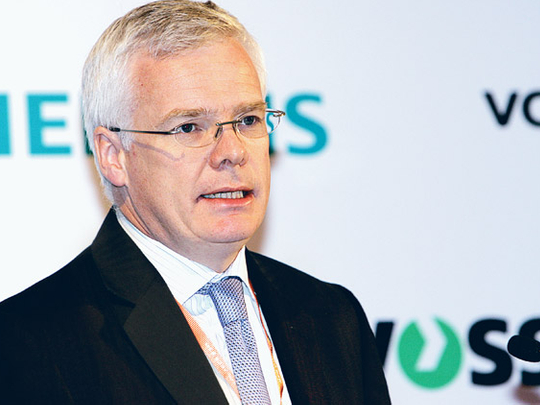
Dubai: The UAE's 1,500-kilometre national railway has broken ground in the southwestern region of the country, according to Richard Bowker, chief executive officer of government-owned Union Railway.
Bore holes have been punched into the desert floor, laying the groundwork for construction of the first 266-kilometre stretch that will link Abu Dhabi's Shah sour gas fields to an export terminal at Ruwais.
Bowker said the company will seek expressions of interest in the next two months or perhaps even earlier if conditions allow.
Competition among bidders is expected to be tough, he said.
"We've already started some preparatory work," Bowker told reporters yesterday at the Middle East Rail 2010 conference under way this week in Dubai.
Union Railway experts are "doing some geotechnical tests" for the initial leg of the Dh30-Dh40 billion ($11 billion) national railway project that will see more than 20,000 tonnes of granulated sulphur transported by freight train daily to the coast where it will be loaded aboard ships bound for international destinations, he said.
Using "heavy haul, larger trains," as much as 7.5 million tonnes of the material will be moved every year, starting in 2013, said Bowker. The project could be completed in seven to eight years.
Many challenges lie ahead in the next three years in Shah and Habshan to lay the track.
Construction crews must run the line over 47 kilometres of what is known as sabka, sand deposits mixed with silt, clay and salt water.
A nearby 85 kilometre-corridor is heavily punctuated with sand dunes as high as 200 metres, requiring a path to be cut through the natural desert features, Bowker said.
Up to 30 bridges will be constructed along with camel and wadi crossings.
Major strides, meanwhile, are being made elsewhere, he said, including major alignment successes in Dubai and other northeastern reaches of the project.
Extending the rail network into the dense urban landscape of Dubai is no easy task, said the former head of transport firm National Express Group of the UK.
Bowker arrived in the UAE in September 2009 to assume the helm not long after the government-owned Union Railway raised $1 billion in capital needed to build the first national rail network in the country.
"We've been working very carefully with our colleagues at the RTA (Roads and Transport Authority)," Bowker said.
"They've done a super job helping us get through to key locations in Dubai such as Jebel Ali."
Mattar Al Tayer, CEO of the RTA, also serves as vice-chairman of Union Railway, Bowker said, alongside chairman Hussain Al Nowais.
In a keynote address to rail delegates from around the globe, Bowker said, "In the last few weeks we have made great steps in finalising the alignment in Dubai."
While acknowledging freight trains will operate between the emirates of Dubai and Abu Dhabi, Bowker made no public comment on word that a high-speed passenger line could be constructed between the two major business hubs.
In his address, however, Bowker did say that Union Railway is planning on bringing online new passenger trains soon after infrastructure is laid down that could travel 200km/h in comparison to sister freight trains operating in the same corridors at speeds of around 120km/h. Using standard 1,435mm track gauge, a double set of tracks will provide flexbility for scheduling train operations.
Bowker said locomotives will be powered by diesel noting that a rail system needs "very large traffic" to justify using electric engines.
While diesel engines will create a larger carbon footprint in the UAE, an exponential shift in the amount of cement, steel and petrochemicals moved by rail is expected to sharply cut the number of emission-emitting transport trucks on the highways, not only reducing traffic congestion but also pollution.
One of the key pushes behind the rail is "to get the trucks off the ground...and get it [cargo] on to rail," he said.
Since forming its board in December 2009, Union Railway has populated its head office in Abu Dhabi with about 40 staff to create a "fully functioning and growing company", but he told Gulf News its still too early to determine how large employee rolls will number when 100 per cent operational.
One of the new hires is a 28-year transportation veteran, Mike Darby, who will serve as the new operations manager overseeing the firm's No 1 priority of safety, Bowker said.
Bowker said Union Railway is committed to hiring Emiratis and is in talks with universities to support educational programmes that will "attract and retain nationals."
One of the key challenges for staff, he said, will be border-control issues as the new UAE national railway links up Saudi Arabia via Ghweifat city in the west and Oman via Al Ain in the east.



